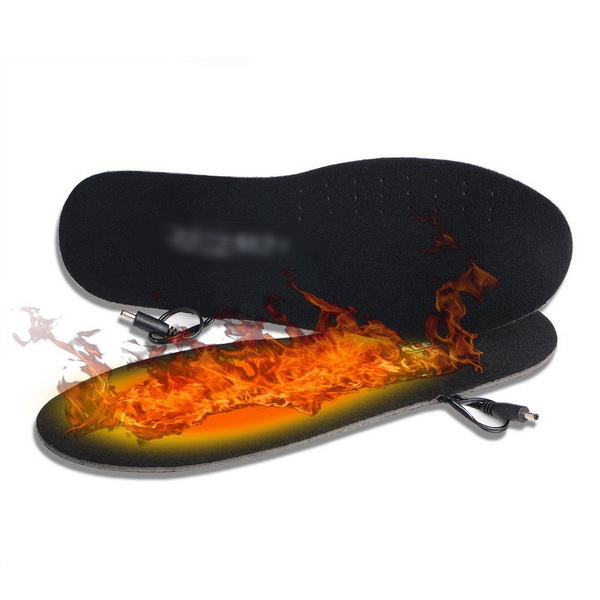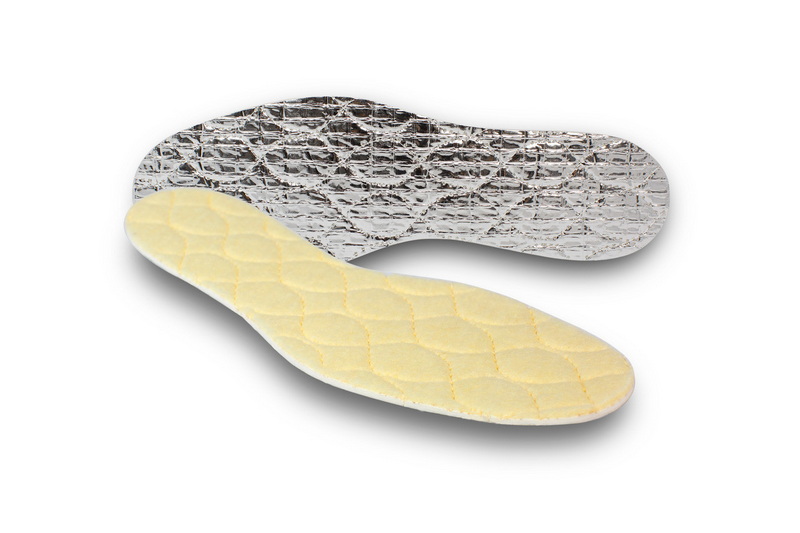Views: 222 Author: Edvo Publish Time: 2025-10-25 Origin: Site











Content Menu
● What Are Heated Socks And Insoles?
● How Do Heated Socks and Insoles Work?
● Benefits Of Heated Socks And Insoles
>> 1. Continuous Warmth and Comfort
>> 2. Improved Blood Circulation
>> 4. Suitable For Multiple Scenarios
>> 5. Eco-Friendly and Cost-Effective
● Heated Socks vs Heated Insoles
● Technological Features That Matter
>> Sports And Adventure Enthusiasts
>> Elderly Or Medical Patients
● OEM And ODM Manufacturing Options
● Material And Design Customization
● Maintenance And Safety Instructions
● Troubleshooting Common Problems
>> Power Button Not Responding
● Why Heated Footwear Is A Growing Market
● Are Heated Socks Or Insoles Worth It?
● FAQs
>> 1. How long can heated socks or insoles stay warm?
>> 2. Are they safe to use for long periods?
>> 3. Can I use them while skiing or hiking?
>> 4. What temperature range should I expect?
>> 5. How can I customize heated footwear for my brand?
Heated socks and heated insoles have transformed how people deal with cold conditions, offering warmth, comfort, and convenience during freezing temperatures. From professional outdoor workers to adventure enthusiasts, these innovative footwear accessories make a significant difference. But when it comes down to value—are heated socks or insoles truly worth buying?
This comprehensive guide explores how they work, their advantages, target users, and what to consider before choosing one. We'll also discuss OEM manufacturing opportunities for brands and distributors interested in entering this rapidly expanding niche.

Heated socks and insoles are modern thermal solutions designed to generate and retain warmth using electric heating technology. Each includes a rechargeable battery system and flexible heating elements that distribute consistent heat across the foot area.
- Heated Socks: These are standard socks enhanced with thin heating wires woven into the fabric around the toes and soles. They usually come with a small rechargeable battery pack clipped at the calf or ankle.
- Heated Insoles: These are removable footbeds placed inside any shoe. They feature built-in or detachable power sources controlled manually or through mobile applications.
Both serve the same goal—keeping your feet warm and comfortable regardless of extreme outdoor temperatures.
The working principle is based on electric resistance heating, similar to the technology used in electric blankets. As current flows through the conductive materials, heat is generated and distributed across the fabric or sole layer.
Both types are powered by rechargeable lithium-ion batteries and can maintain warmth for 6–10 hours per charge. Some advanced insoles even support USB-C fast charging or mobile app temperature regulation. Typical heat settings range from 35°C to 55°C, allowing users to choose their comfort level depending on the environment.
To ensure durability, manufacturers use a multilayer composite structure:
- Inner layer: soft, breathable moisture-wicking fabric
- Middle layer: heating elements made from carbon fiber or graphene
- Outer layer: insulating fabric or EVA foam to maintain heat distribution
This combination creates an efficient heat management system suitable for everyday use and professional outdoor activities.
Heated footwear ensures that your feet remain warm throughout the day, preventing numbness caused by prolonged cold exposure.
Moderate warmth helps promote healthy blood flow in the lower extremities, beneficial for people with circulation-related issues.
For workers in frozen areas, steady foot temperature reduces the risk of frostbite or sudden muscle tension caused by cold shock.
These products are ideal for winter sports, mountain exploration, outdoor maintenance work, and medical recovery assistance.
Rechargeable design minimizes waste compared to disposable warmers. Over time, it becomes a sustainable investment both for personal users and retail brands.
The global demand for heated apparel and smart wearable accessories is rising quickly. For OEM manufacturers, producing customized heated socks and insoles creates new business opportunities in international markets such as North America and Europe.
| Feature | Heated Socks | Heated Insoles |
|---|---|---|
| Fit & Feel | Soft like traditional socks, flexible around the foot | Solid structure inside shoes, supportive base |
| Heating Zones | Toes, ball of foot, or full foot | Sole and mid-foot area |
| Power Options | External battery near calf | Built-in heel battery or remote power pack |
| Ideal Use Case | Outdoor sports, skiing, home use | Work boots, cycling, industrial wear |
| Maintenance | Hand washable | Wipe clean with damp cloth |
| Comfort Level | Excellent for warmth; more textile flexibility | Excellent for power consistency and performance |
User preference usually depends on activity type. For instance, skiers often prefer socks for full coverage, while motorcyclists or warehouse employees may choose insoles for compatibility with multiple shoe types.
When deciding between heated socks or insoles, considering personal habits and operating environments helps determine better value.
- If comfort is priority: Go for heated socks. Their soft, fabric-based design ensures all-around warmth and relaxed fit.
- If versatility matters more: Heated insoles fit numerous footwear types, ideal for users switching between work shoes, boots, or sports footwear.
- If battery runtime is critical: Check the capacity rating (mAh). Larger batteries (e.g., 4000–5000 mAh) offer up to 10 hours of consistent warmth.
- If you require convenience: Bluetooth-enabled versions allow remote temperature control, perfect for active users on the move.
Each model offers different heating coverage, heating speed, and flexibility depending on the material composition.

Modern heated footwear integrates several smart and ergonomic technologies:
- Graphene Heating Films – Distribute heat uniformly while remaining ultra-thin and energy-efficient.
- Temperature Sensors – Prevent overheating by automatically adjusting temperature.
- Smartphone Connectivity – Allows on-demand temperature regulation and battery tracking.
- Rechargeable Power Banks – Some socks support interchangeable battery packs for extended outdoor usage.
- Moisture Control – Anti-bacterial and sweat-wicking coating maintains hygiene for prolonged wear.
These advanced details differentiate premium OEM models from low-end retail versions and help brands position their products at a higher market tier.
Construction workers, traffic personnel, and delivery drivers can stay productive in below-freezing environments without discomfort.
From snowboarders to hunters, heated accessories preserve endurance and mobility even in icy conditions.
People with chronic cold feet or circulation issues experience notable relief through consistent warmth.
Companies providing work uniforms or protective gear can incorporate custom-branded heated insoles for employee safety compliance.
For city dwellers or commuters during harsh winter months, heated socks deliver a simple solution to maintain comfort on the go.
As a leading Chinese insole and sock manufacturer, we specialize in designing and producing advanced heated footwear solutions for global brands and wholesalers.
Our OEM/ODM services include:
- Product design assistance and material engineering
- Integration of customized heating panels and sensors
- Pattern development, sizing adjustments, and private labeling
- Brand logo customization (woven labels, printing, or embroidery)
- Professional packaging for eCommerce or offline retail
- Strict quality control aligned with CE, RoHS, and ISO standards
Partnering with a reliable Chinese producer ensures competitive pricing, fast lead times, and continuous product innovation. International partners can request prototypes for evaluation, then proceed to full-scale production once quality expectations are met.
From the material composition to temperature control design, every aspect can be tailored to client requirements.
- Fabric Types: Cotton, merino wool, polyester, spandex, or Lycra blends.
- Insole Base Materials: EVA foam, PU foam, or carbon fiber plates for sports applications.
- Color Options: Custom dyeing or pattern printing to match brand identity.
- Battery Integration Design: Flexible connectors, detachable packs, or ultra-slim embedded units.
- Control Modes: Wired control, remote Bluetooth modules, or touch-sensitive control surfaces.
Through complete OEM services, international buyers can build distinct heated footwear lines under their own brand names.
Proper use and care extend the life span and ensure consistent performance.
- Remove batteries before washing.
- Do not tumble dry or expose to direct sunlight.
- Avoid piercing the heating element or bending the wire excessively.
- Use original charger and cables to prevent battery damage.
- Store products in a cool, dry location with batteries partially charged if unused for long.
Following these steps helps maintain safety and product efficiency, especially in high-humidity or extreme temperature environments.
Confirm the charging cable is securely connected and the power adapter matches the required output. Replace damaged cables if needed.
Check for wrinkles or poor contact with feet. If one side remains cold, inspect wiring continuity.
Repeated overcharging can reduce lifespan. Replace old batteries after 300–400 cycles.
Ensure correct temperature settings or battery levels. Cold environments may reduce performance slightly due to thermal dispersion.
Hold the button for at least 3 seconds. Some advanced models include safety delay to prevent accidental activation.
Such proper troubleshooting ensures long product life and sustained satisfaction.
The global heated apparel industry is projected to grow significantly in the next few years due to rising consumer interest in ergonomic technology. Advancements in wearable electronics, safety innovation, and sustainable battery designs make these items mainstream winter gear.
For international importers and distributors, heated socks and insoles represent:
- High seasonal sales volume
- Year-round industrial usage
- Opportunities for smart wearable branding
- Ease of customization and eCommerce packaging
Our factory's design flexibility and scalable production capacity make us a strategic supplier to help your business expand.
Yes — they are absolutely worth the investment for users and businesses alike. Heated socks and insoles are not just comfort accessories; they represent a blend of wellness, safety, and performance technology.
For consumers, they provide lasting warmth, convenience, and health benefits. For brand owners and OEM partners, they open market access to winter apparel, safety footwear, and sportswear distribution channels worldwide.
Choosing the right model depends on specific needs:
- Heated socks for comfort and coverage
- Heated insoles for flexibility and adaptability
Either way, they contribute significantly to foot comfort and well-being in harsh climates.
Heated socks and insoles have become indispensable winter accessories offering warmth, safety, and innovation. With increasing technological advancement, improved battery efficiency, and smart control integration, their practicality and reliability continue to grow.
For users, investing in a quality pair ensures comfort during every winter activity. For foreign brand owners and wholesalers, collaborating with a professional Chinese OEM heated footwear manufacturer guarantees access to cost-effective customization, superior materials, and reliable production systems.
Whether you are enhancing a sportswear line or improving workplace gear, heated socks and insoles deliver proven value in performance, comfort, and brand innovation.

On average, heated socks or insoles maintain warmth for 6–10 hours per charge depending on heat level and battery capacity.
Yes, most models include safety circuits that prevent overheating. Always use recommended chargers and moderate temperature settings for extended wear.
Absolutely. Heated socks are great for outdoor sports, while heated insoles suit various boots, providing steady warmth even in extreme snow conditions.
Typical ranges are between 35°C and 55°C. Users can adjust levels based on environment and comfort via smart controllers or preset modes.
You can collaborate with our OEM team for material selection, logo integration, design engineering, and packaging to match your retail or wholesale branding requirements.